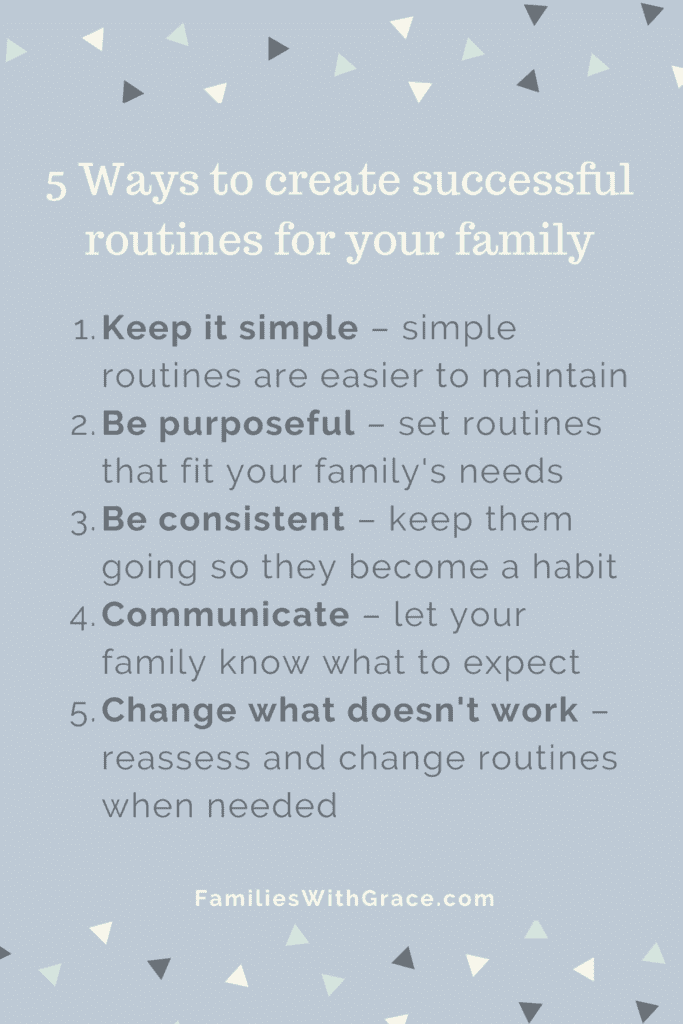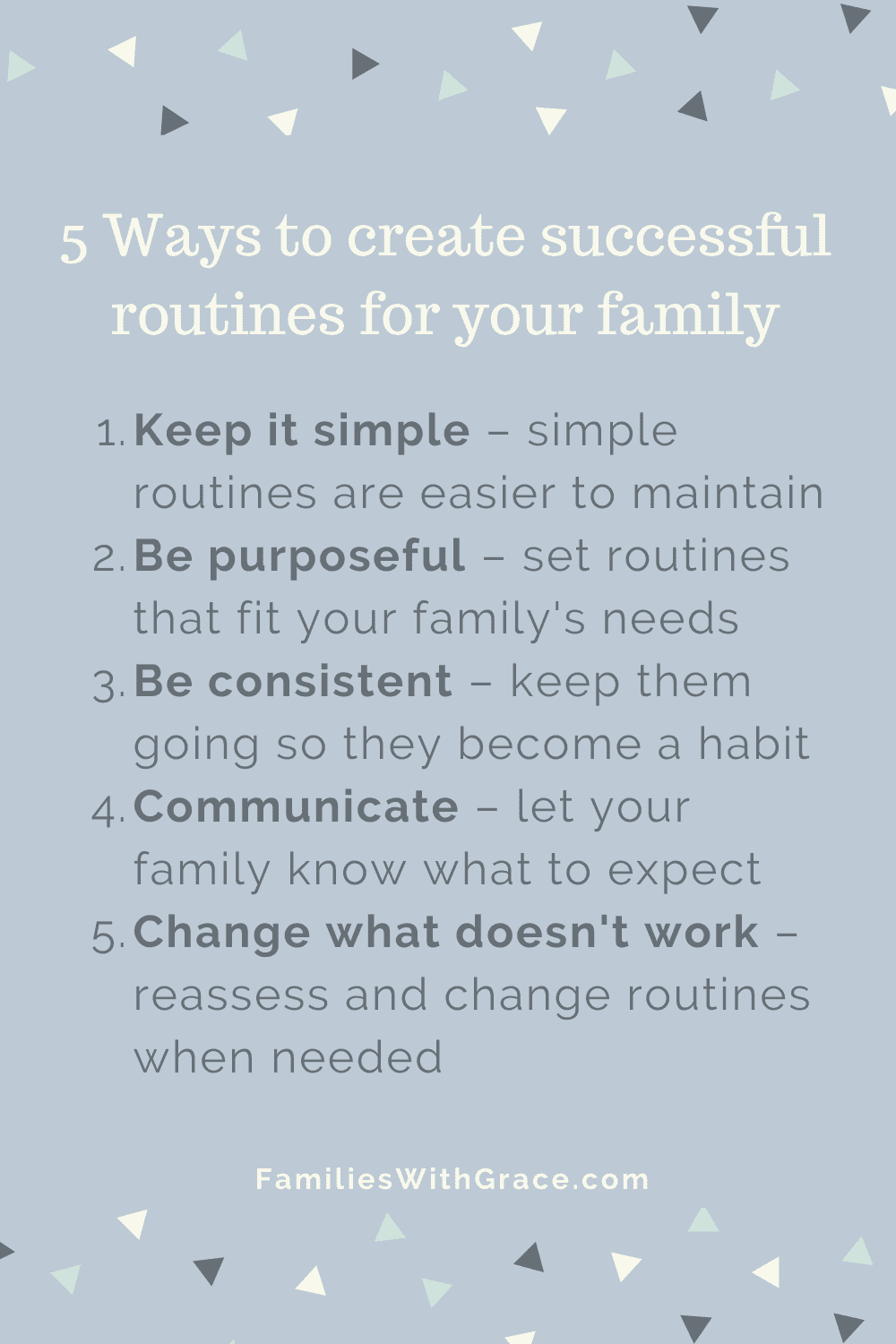5 ways to create successful routines
Studies abound about the benefits kids glean from having predictable routines at various ages. For example, a 2016 study from The Journal of Applied Developmental Psychology found that people who had predictable routines in childhood were more likely to have better time management skills and attention spans in adulthood.

Another study back in 2014 in the Journal of Developmental and Behavioral Pediatrics found that preschoolers who had routines including things like singing, reading, playing and eating dinner with their families were emotionally healthier. And a study last year in BMC Public Health concluded that bedtime routines are associated with children’s wellbeing.
The studies continue on and on from researchers who specialize in such things. I can just tell you that as a mom, I’ve found routines to be invaluable to our family’s happiness. My kids thrive when they know what to expect and how things will go. I think we all end up happier and even getting better rest with maintaining a few routines.
1. Keep it simple.
When it comes to routines, the simpler the better because that makes them easier to maintain. During my daughter’s toddler days as we were really getting settled into a bedtime routine, my husband and I talked about what we wanted to do each night and how to keep it simple. We opted not to include a bath in our nightly routine because giving a bath every single night just wasn’t going to happen.
So we decided on prayer, a book, two songs and then being tucked in. Nine years later that routine is almost exactly the same. We don’t do the songs any longer, but we pray, read and tuck in every single night.
This has varied a bit through the years as the kids have grown. When they had different bedtimes and were farther apart cognitively, we did things differently. They each had their own version of this bedtime routine.
Since moving into our new house, we have shifted so that both kids do their bedtime hygiene routines and then head to a bedroom where they both pray, we read a book out loud (usually a chapter of a book these days) and we exchange hugs and kisses all around.
2. Be purposeful.
Don’t create a routine just for the sake of creating one. Our bedtime routine, for example, helps our kids wind down each evening because they know what’s coming and it’s how they’ve always gone to bed.
Other routines are more out of necessity. Like school mornings mean I wake up the kids and they go to the bathroom, get dressed and style their hair before coming to breakfast. The night before, I lay out clothes for them (complete with undies and socks) so there is no scrambling around in the morning trying to decide what to wear.
Everything has a purpose. They get dressed first because they can take their breakfast in the car if they have to but they can’t change clothes in the car on the way to school. It also gives me time to make their breakfast while they are doing their tasks. And every morning they know what to expect so our mornings are pretty calm.
3. Be consistent.
This sounds obvious, but in order for a routine to work and stick, you have to be consistent. While research can’t completely agree on how long it takes to form a habit (anywhere from 7 to 66 days!), it does take time. And that means you have to be consistent even when you don’t feel like it.
Our bedtime routine, for example, took us working at it every single night to make it happen. I won’t even pretend that it always runs smoothly even now, because kids are kids and get distracted. Just the other night I had to tell my son to stop foot attacking his sister and brush his teeth because the kiddos were goofing off a bit.
BUT, they were still sticking with routine. He had his toothbrush in his hand as did she. That also means that when I don’t feel like following through with what my kids expect then I need to.

Of course there are exceptions to the rule. Life happens. People get sick. Schedules get changed. But be consistent as possible and routines will get ingrained, stick around and be effective.
4. Communicate.
I’m not sure I can think of a family topic that doesn’t include communication. Communication is so incredibly important. It is important when setting and sticking to routines as well.
For example, my husband and I have discussed what some of our routines will be. We’ve discussed what will work for bedtime or getting ready in the mornings. We’ve made plans of action together so that we are on the same page.
When the routine changes up, like our one night of the week that the kids have gymnastics and ninja class, we make sure to remind the kids of it. We tell them how and why things will be different and what to expect. So even if our routine switches up they know what to expect and handle it much better as a result.
5. Change what doesn’t work.
Sometimes you start a routine and even if you’ve been purposeful, communicated about it and stuck with it, it just isn’t working. Don’t stick with it just to stick with it. Adjust it to make it work.
We recently changed up a bit of our bedtime routine to move from our room to our son’s room to see if it will help him settle into bed a bit easier. (The verdict still isn’t in on that one, but we will continue to tweak as needed.) Life changes, kids and their needs change, so sometimes routines need to change and adjust as well.




